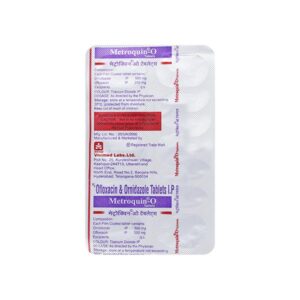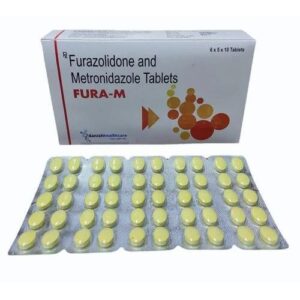METRONIDAZOLE + FURAZOLIDONE
Metronidazole: Metronidazole, commonly known by the brand name Flagyl, is an antibiotic medication used for the treatment of various bacterial and parasitic infections. It belongs to the nitroimidazole class of antibiotics.
Metronidazole works by disrupting the DNA structure of the microorganisms, leading to their inhibition and eventual death. It is particularly effective against anaerobic bacteria, which thrive in low oxygen environments, as well as certain protozoal parasites.
This drug is commonly used to treat conditions such as bacterial vaginosis, trichomoniasis, giardiasis, and certain types of infections caused by Helicobacter pylori (bacteria associated with peptic ulcers). It may also be used in combination with other antibiotics for more severe infections.
The dosing regimen for metronidazole varies depending on the specific infection being treated. It is available in various forms such as oral tablets, capsules, and suspension, as well as topical creams and gels. The typical oral dose for most infections ranges from 500 to 750 mg three times per day for 7 to 14 days. However, the exact dosage should be determined by a healthcare professional based on the individual’s condition and response to treatment.
While generally well-tolerated, metronidazole can cause some side effects. Common side effects may include nausea, vomiting, diarrhea, metallic taste in the mouth, and dizziness. Less common but more severe side effects include allergic reactions, encephalopathy (brain disorder), neuropathy (nerve damage), and a disulfiram-like reaction (similar to the effects of alcohol, causing severe nausea and vomiting) when alcohol is consumed alongside the medication.
Metronidazole should not be used during the first trimester of pregnancy, as it may harm the developing fetus. It should also be used with caution in patients with liver disease.
As always, it is important to consult a healthcare professional or pharmacist for specific dosing instructions, possible drug interactions, and any concerns about side effects before starting metronidazole treatment.
Furazolidone: Furazolidone is an antibiotic medication that is primarily used to treat bacterial infections. It belongs to a class of drugs known as nitrofuran antibiotics.
The mechanism of action of furazolidone involves the inhibition of certain enzymes within the bacterial cells, which eventually leads to the disruption of their protein synthesis and DNA replication. This inhibitory effect ultimately kills or prevents the growth of the bacteria, thereby addressing the infection.
Furazolidone is commonly prescribed for the treatment of gastrointestinal infections, such as diarrhea caused by certain bacterial pathogens like Escherichia coli, Salmonella, and Shigella. It can also be used in the management of Helicobacter pylori infections, which are associated with peptic ulcers.
The usual adult dose of furazolidone for gastrointestinal infections is 100 mg four times daily for seven to ten days. However, the dosage may vary depending on the severity of the infection and the individual patient’s response. It is essential to follow the instructions provided by the healthcare professional or the medication label for the correct dosage.
As with any medication, furazolidone can cause certain side effects, although not everyone experiences them. Common side effects may include nausea, vomiting, stomach cramps, headache, dizziness, and discoloration of urine. If these side effects persist or become severe, it is advisable to consult with a healthcare provider.
Rare but potentially serious side effects of furazolidone can include blood disorders, allergic reactions (e.g., rash, itching, swelling), and peripheral neuropathy. If any unusual or severe symptoms occur, immediate medical attention should be sought.
Furthermore, it is important to note that furazolidone may interact with several medications, such as certain antidepressants, monoamine oxidase inhibitors (MAOIs), and other antibiotics. Therefore, it is crucial to inform the healthcare provider about all medications and supplements being taken to avoid potential drug interactions.
Overall, furazolidone is an antibiotic that is primarily used for the treatment of gastrointestinal infections. It works by inhibiting bacterial enzymes involved in protein synthesis and DNA replication. The medication should be taken as directed by a healthcare professional, and potential side effects and drug interactions should be carefully monitored.


